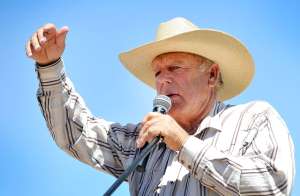
Armed Standoff Leads To Legal Standoff
In 2014, armed ranchers engaged in a standoff with federal agents over unpaid grazing fees and access rights to federal land. The incident did not result in any exchanged gunfire or casualties (in stark contrast to the number of police shootings involving unarmed civilians). The standoff did result in several charges and following a trial…no result. A mistrial was declared forcing federal prosecutors to decide whether to retry the cases.
LAS VEGAS — A U.S. judge declared a mistrial Wednesday in the Nevada case against a states’ rights figure, his two sons and another man accused of leading a 2014 armed standoff with federal agents during a cattle grazing dispute.
Chief U.S. District Judge Gloria Navarro in Las Vegas dismissed a jury seated last month for the long-awaited trial of Cliven Bundy, his sons Ryan and Ammon Bundy and self-styled Montana militia leader Ryan Payne.
It is the latest in a string of failed prosecutions in Nevada and Oregon against those who have opposed federal control of vast swaths of land in the American West.
Jurors acquitted the two Bundy sons of taking over a federal wildlife refuge in Oregon for more than a month in early 2016 and amid calls for the U.S. government to turn over public land to local control.
In the Nevada case, Navarro faulted federal prosecutors for failing to turn over all evidence to defense attorneys, including records about the conduct of FBI and Bureau of Land Management agents during the standoff.
“The government is obligated to disclose all evidence that might be favorable” to the defense, the judge said.
The case stemmed from an armed confrontation that capped a decadeslong dispute over Cliven Bundy’s refusal to pay grazing fees. The 71-year-old rancher says his family has grazed cattle for more than a century in the area and insists public land belongs to states, not the U.S. government.
Government agents began rounding up his cattle. The four on trial were accused of enlisting armed gunmen to force government agents to abandon the effort.
“A mistrial is a very bad result for the government,” said Ian Bartrum, a University of Nevada, Las Vegas, law professor who has followed the case closely.
Bartrum had cast the trial as a test of whether the federal government could enforce its own land policy in Western states where it owns or controls vast expanses.

